高二英语语法第二讲
- 格式:doc
- 大小:57.00 KB
- 文档页数:5


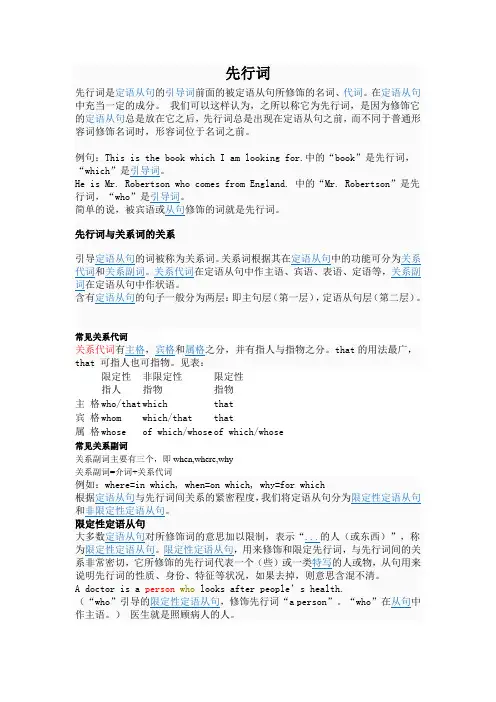
常见关系代词限定性指人非限定性指物限定性指物主格who/that which that宾格whom which/that that属格whose of which/whose of which/whose 常见关系副词关系副词主要有三个,即when,where,why关系副词=介词+关系代词非限定性定语从句非限定性定语从句的特点:非限定性定语从句起补充说明作用,也不会影响全句的理解,译为汉语时常常不译作定语,而根据句意翻译为相应的其他形式的从句。
对它与主句的关系不如限定性定语从句的关系紧密,只是对先行词作些附加说明,即使去掉,主句的意思依然清楚。
在非限定性定语从句的前面往往有逗号隔开,如若将非限定性定语从句放在句子中间,其前后都需要用逗号隔开。
1.限定性定语从句:从句不能省略,如果省略整个句子意思不完整。
非限定性定语从句:从句可以省略,如果省略整个句子意思仍然完整。
2.限定性定语从句:先行词可以用“that”引导。
非限定性定语从句:先行词不可以用“that”引导。
3.限定性定语从句:引导词有时可以省略。
非限定性定语从句:引导词不可以省略。
4.限定性定语从句:主句与从句不需要用逗号隔开。
非限定性定语从句:主句与从句需要用逗号隔开。
5.限定性定语从句:从句只修饰先行词。
非限定性定语从句:从句既可以修饰先行词,也可以修饰整个句子或句子的一部分。
1.Is this the factory __________ you visited the other day?A. thatB. whereC. in whichD. the one2. The wo lves hid themselves in the places __________ couldn’t be found.A. thatB. whereC. in whichD. in that3. This book will show you __________ can be used in other contexts..A. how you have observedB. what you have observedC. that you have observedD. how that you have observed4. The reason is __________ he is unable to operate the machine.A. becauseB. whyC. thatD. whether5. Is that the reason __________ you are in favour of the proposal?A. whichB. whatC. whyD. for that3.This book will show you what you have observed can be used in other contexts.这句话的意思是:这本书将向你展示你观察到的东西如何在其他环境中使用从句中的谓语observe是观察的意思,及物动词,必须跟宾语,但是它的后面没有宾语,所以连接词必须是能在从句中充当宾语的,how只能做状语,所以A和D都不对,至于that 它在从句中不做成分,也不能选。
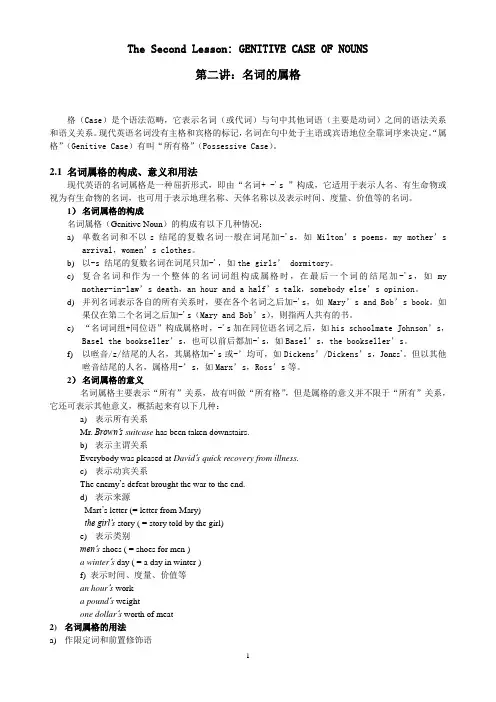
The Second Lesson: GENITIVE CASE OF NOUNS第二讲:名词的属格格(Case)是个语法范畴,它表示名词(或代词)与句中其他词语(主要是动词)之间的语法关系和语义关系。
现代英语名词没有主格和宾格的标记,名词在句中处于主语或宾语地位全靠词序来决定。
“属格”(Genitive Case)有叫“所有格”(Possessive Case)。
2.1 名词属格的构成、意义和用法现代英语的名词属格是一种屈折形式,即由“名词+ -'s ”构成,它适用于表示人名、有生命物或视为有生命物的名词,也可用于表示地理名称、天体名称以及表示时间、度量、价值等的名词。
1)名词属格的构成名词属格(Genitive Noun)的构成有以下几种情况:a)单数名词和不以-s结尾的复数名词一般在词尾加-'s,如Milton’s poems,my mother’sarrival,women’s clothes。
b)以-s 结尾的复数名词在词尾只加-',如the girls’ dormitory。
c)复合名词和作为一个整体的名词词组构成属格时,在最后一个词的结尾加-'s,如mymother-in-law’s death,an hour and a half’s talk,somebody else’s opinion。
d)并列名词表示各自的所有关系时,要在各个名词之后加-'s,如Mary’s and Bob’s book。
如果仅在第二个名词之后加-'s(Mary and Bob’s),则指两人共有的书。
e)“名词词组+同位语”构成属格时,-'s加在同位语名词之后,如his schoolmate Johnson’s,Basel the bookseller’s,也可以前后都加-'s,如Basel’s,the bookseller’s。
f)以咝音/z/结尾的人名,其属格加-'s或-’均可,如Dickens’/Dickens’s,Jones’。
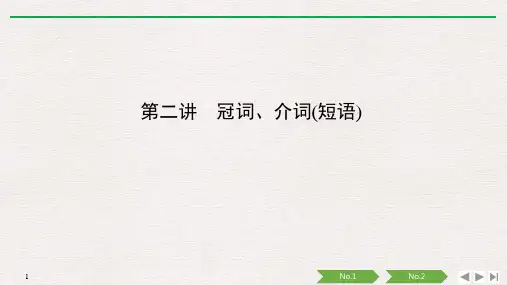
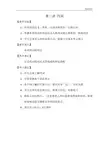
英语语法
第二讲代词
【教学目标】
1.对代词的定义、性质、功用及种类有一定的认知
2.掌握各类代词的用法以及人称代词前后指称的一致的用法
3.学习完本单元的语法要点后,能独立完成本单元练习
【教学重点】
各类代词的用法
【教学难点】
不定代词的用法及其构成的固定搭配
【学习建议】
1.首先总体了解代词
2.尽量掌握各个语法要点
3.各个例子最好烂熟于心,然后再举一反三,及时巩固
4.学习完所有语法要点后,简要小结后,再做练习
5.做练习的过程中,一定要清楚之所以选择该答案的原因,即要
知道每道练习题所包含的语法要点。
6.建议学习时长:0.7课时。

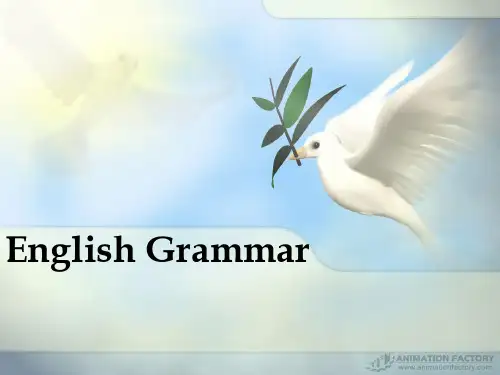



高考英语二轮复习语法填空专项讲练第二讲有提示词填空---提示词为动词◎提示词为动词解题方法---“一定三思”法◎提示词动词作谓语动词解题方法1.分析句子结构,找出句中是否缺少谓语动词,如果缺少谓语,则应填谓语动词(注意高考常在从句中考察谓语动词);2.根据时间标志词、并列谓语、上下文语境或固定句式确定用哪种时态;3.根据主语和谓语之间的主被动关系确定是否用被动语态;4.根据主语确定谓语动词的数,即要符合主谓一致原则。
例1:(2021年全国新高考1卷·61) You can’t help wondering how hard it__________(be) for the people then to put all those rocks into place.例2:(2021年全国甲卷·61) The Xian City Wall is the most complete city wall that has survived China’s long history. It__________ (build) originally to protect the city in the Tang dynasty and has now been completely restored (修复).例3:(2021年浙江卷) It doesn’t impress like George Washington’s plantation on the Potomac, but Lincoln’s home in downtown Springfield, Illinois, ___________ (prove) irresistible to visitors since it opened to the public.微技能1:确定谓语动词时态的四种方法方法1:慧眼识别时间标志词1. (2020年全国Ⅰ卷·61)The unmanned Chang’e-4 probe (探测器)—the name was inspired by an ancient Chinese moon goddess— ________ (touch) down last week inthe South Pole-Aitken basin.2. (2019年全国Ⅰ卷·65) In recent years some Inuit people in Nunavut _________ (report) increases in bear sightings around human settlements.3. (2019年全国Ⅰ卷·66) Irene said, “I don’t see any reason to give up work. I love coming here and seeing my family and all the friends I ___________(make) over the years.4. (2020年浙江高考)By about 6000 BC, people ___________(discover) the best crops to grow and animals to raise.Later, they learned to work with the seasons...链接:重要时间标志词速记1.一般现在时( do/does; am/is/are):every day、always、often、seldom、sometimes、usually等。
第二讲动词及动词词组一定义:表示动作或者状态的词叫做动词。
二动词的分类其用法1.按在句中的功能分类2. 根据是否受主语的人称和数的限制时态 (按高考要求共十一个时态) 谓语动词 语态 (主动语态和被动语态) 语气 (陈述语气和虚拟语气) 主谓一致动词动词不定式 非谓语动词 动名词分词 (现在分词和过去分词) 3. 根据动词的组成形式 常考动词词组1. agree vi. 同意;持相同意见1) agree on /about/upon sth (就价钱、条件等)达成协议,商定2) agree that … 同意……(接从句) 3) agree to do 同意去做4) agree to one's plan/suggestion 采纳某人的计划(建议)5) agree with one's idea/opinion/analysis 同意某人的看法(见解)6) sth agree with sb. ①(衣服,食物等)适合某人 ②与……一致 ③同意、赞同7) agree with sb. on that point 在那方面同意某人 2. ★break vt.打破;损坏;破坏1) break down 机器坏了=go wrong 身体垮了/终止谈话2) break in 闯入,插话3) break off 忽然停止讲话/断绝,结束/暂停工作,休息4) break out (战争等)爆发; 逃出(无被动式)5) break through 打破包围6) break up 驱散,学校的放学, 破碎,(使)(人与人关系)发生破裂,断绝关系,关系破裂(或中断);(使)(夫妇)离异7) break away from 脱离,逃说,与...断绝来往/改变某种习惯8) break one's promise/words 破坏某人的诺言、食言 9) break the record 打破纪录 10) break the rules 违反规则 3.bring vt.拿来;带来;取来1) bring about =cause, result in, lead to 带来、造成 2) bring force 使产生,引起3) bring forward 提出建议=put forward/提前 4) bring in 引进5) bring back to one's mind 使回想起 6) bring up sb 抚养某人7) bring up sth 提出 bring up 呕吐 8) bring to an end 结束=come to an end 9) bring down 使倒下,使下降4.call vt.叫喊;打电话给…1) call on sb 拜访,号召call on sb to do号召某人做某事2) call at sp.访问(某人的家);(火车、船)停靠3) call for 需要,邀请4) call for sb 去接某人一起去做某事5) call off 取消(计划,比赛)6) call out (call out+to sb.)大声地叫7) call up sb ①使……想起②给……打电话8) call one's attention to sth. 让某人引起对……的注意5.carry vt.携带;运载;传送1) carry out 进行到底,贯彻执行2) carry on 进行下去,坚持下去3) carry away 拿走,入迷,被...吸引4) carry forward 推进,发扬(精神)5) carry off 抢走,夺走/获得奖品6) carry through 进行到底,完成计划7) carry sb through 使...渡过难关8) carry out one's promise 遵守某人的诺言6.catch vt.捉;抓住vi.接住1) catch up 赶上2) catch on 勾住,绊倒3) catch at 想抓住4) be caught in the rain 被雨淋5) catch up with 赶上某人,补上工作6) catch a cold 感冒7) catch fire 着火7.clear a.清澈[晰]的vt.清除1) clear up (天气)转晴,澄清事实,整理收拾2) clear away 清除掉,去掉,消散3) clear off 消除(积雪)等障碍,把...拆掉,擦掉,清除8. ★come vi.到来; 变得; 到达1) come across 偶然发现,偶然遇到2) come on 快点(口),开始,到来,举行,走吧,一起去3) come down 倒下,(温度,价格)下降,病倒4) come forward 涌现,主动地响应要求做某事5) come from 来自于6) come out ①产生、出现②被知道③出版、发行④结局、结果7) come to 苏醒,总共,达到,得到谅解come to oneself 苏醒、恢复知觉8) come up sb 走进9) come up ①上升②发生③产生④(问题、话题、议题)被提出(无被动)10) come up with something. 想出个办法11) come to one's rescuers 帮助12) come true 实现13) come at 向...扑过来,向...袭击14) come in 进来,上市15) come into effect 生效、启用come to power 掌权9.cut v.割,切,削减,切断1) cut sth in half 把...砍成两半cut sth. into halves 把……切成两半cut sth. into two parts 把……切成两半2) cut away 切除,逃跑3) cut through 走近路,剌穿4) cut down 砍倒,减少,压缩(开支)5) cut off 切断(关系,来往),中止(电话,思维)6) cut out 删掉/改掉(恶习),停止7) in a short cut 诀窍8) cut up 割开;切碎10.die vi.死亡; 枯死; 熄灭1) die from 因饥渴,战争,被污染的意外死亡2) die off 因年老,疾病而死亡3) die away 声音变弱,渐渐消失/停息,消失4) die down 慢慢地熄灭(风,火)5) die out 熄灭,变弱,消失,灭绝(动物)11. lose1) lose heart 失去信心2) lose one's life/lives 丧命3) lose one's sight 失明4) lose one's temper 发脾气5) lose one's way 迷路6) lose touch with 与……失去联系7) lose weight 减少体重12. fall vi.落下;跌倒;陷落1) fall a sleep 去睡觉=go to sleep fall ill 病了2) fall across 遇见(偶然)3) fall back 后退,后撤4) fall behind 落后,跟不上5) fall in 集合/陷入fall in love with sb. 爱上某人6) fall off 减少,从...7) A fall into a pit, a gain in your wit.吃一堑,长一智。
高考英语语法讲义第二讲定语从句一、简单句:6种基本句型1、S+V2、S+V+O3、S+V+P4、S+V+Oi +Od5、S+V+O+C6、T here be结构二、并列句三、复合句由一个主句和一个或多个从句构成的句子叫复合句。
主句是复合句的主干部分,从句时修饰主句或主句的某个部分的。
高中阶段要求掌握的从句为名词性从句、定语从句和状语从句。
四、定语定语是用来描述名词或代词的修饰语,他常和名词构成名词短语。
1、前置定语:形容词、代词、数词、名词或名词所有格、动词的-ing形式如:an exciting match university student2、后置定语:形容词、副词、介词短语、不定时、动词的-ing形式、动词的-ed形式。
如:anything important,a friend in need五、定语从句1、构成:先行词+关系词+从句(陈述句语序)2、先行词:被定语从句修饰的名词、代词成为先行词。
先行词总是出现在定语从句之前。
Generally speaking, People who have the highest EQ are the most successful.3、关系词:常见的关系代词:常见的关系副词:六、限制性定语从句与非限制性定语从句1、限制性定语从句用来修饰和限定先行词,与先行词间的关系非常密切,如果去掉,则意思则含糊不清。
666/A doctor is a person who looks after people’s health.2、非限制性定语从句:概念引导非限制性定语从句的关系代词:七、关系代词的用法1、who:用于指人,在定语从句中作主语。
In this earthquake, the number of people who lost homes reachedas many as 250,000.2、whom:用于指人,在定语从句中作宾语。
The doctor whom you are looking for is in the room.3、which:1)一般指物,在定语从句中作主语、宾语。
高二英语语法第二讲GOALS: 1. 现在完成时&现在完成进行时的讲解与练习;2.阅读练习;3. 完型填空讲解。
现在完成时:过去发生并且已经完成的动作对现在造成影响或后果,过去某一时间开始并一直持续到现在的动作或状态。
Jack has read the story twice. They have known each other for ten years.1.句型结构:肯定句___________________________________否定句___________________________________疑问句____________________________________时间状语及其标志:________________________________________________________ __ _______________________________________________________________________________ _______________________________________________________________________________ 2.语法强化定义:(1)强调动作是过去发生的(2)强调对现在的影响或结果(3)在过去不确定的时间里发生的动作,但是结果对现在有影响。
一、练习:1. “How do you like the song, Two Butterflies?” “Great! I ______ such a beautiful song before.”A. don’t hearB. never hearC. have never heardD. has never heard2. In the past few years there _______ great changes in my hometown.A. have beenB. wereC. has beenD. are3. “Kitty, will you go to see Spiderman 3 with us this evening?” “Sorry. I _____ the film already.”A. sawB. have seenC. had seenD. see4. “Why don’t you go to the movie with me, Betty?” “Because I ______it twice.”A. seeB. will seeC. sawD. have seen5. “How can you start playing games so soon, Tom?” “I ______ my homework, mom.”A. have finishedB. finishedC. finishingD. finish二、用过去时或现在完成时填空:1. “_________ you __________ (have) lunch yet?” “Yes.”“When ________ you __________ (have) it?”“I ____________ (have) it at 12:00.”2. “_________ you __________ (write) a letter to your aunt yet?”“Yes, I ___________. I ________________ (write) one last week.”3. “_________ he ___________ (finish) his homework?” “Not yet.”4. “_________ they ever __________ (be) abroad?” “Yes, just once.”5. Your father _________ just ___________ (finish) his work.三、用have(has) been 或have(has) gone 填空。
A: Where ____________ Li Fei ___________?B: He ____________ to Hainan Island.A: How long ___________ he ___________ there?B: He _____________ there for three days.Where there is a will, there is a way.A: When will he come back , do you know?B: I’m afraid he won’t come back recently.A: Could you tell me the way to Hainan Island?B: Sorry, I _________ never ___________ there.A: How many times ___________ Li Fei __________ to that place?B: He _____________ there only once.总结:_____________________________________________________________________ _____________________________________________________________________延续性动词与非延续性动词的区别及其转换:延续性动词可和一段时间连用,非延续动词不能跟一段时间连用。
判断正误并改正:1.I’ve left this school for eight years.2. He has borrowed my dictionary for two days.延续性动词与非延续动词的转换:buy ______ borrow ______ open _______ close ________ begin/start _______ go _______ finish _______ die _______ get up ______ wake up _______ join _______ leave _______短暂性动词转换为延续性动词①arrive at/in sw. get to/reach sw. come/go/move to sw.→ be in sw./at school/at home/on th e farm/be here/be there1) He got to Beijing five minutes ago.He ________ _________ _________ Beijing for _________ _________.2) I moved to the USA last year.I ________ ________ __________ the USA since __________ __________.②come/go back, return → be back come/go out → be out1) He came out two years ago.He _________ __________ _________ for __________ __________.2) We return to Fuzhou yesterday.We ________ ________ _________ to Fuzhou since __________.③become → be1) I became a teacher in 2000.I ________ __________ a teacher for _________ _________.2) The river became dirty last year.The river _________ _________ dirty for _________ __________.④close → be closed open → be openWhere there is a will, there is a way.1) The shop closed two hours ago.The shop ________ _________ _________ for _________ _________.2) The door opened at six in the morning.The door ________ ________ ________ for six hours.⑤get up → be up;die → be dead;leave sw. → be away from sw.fall asleep/get tot sleep → be asleep;finish/end → be over;marry → be married;1) I got up two hours ago.I ________ ________ ________ since ________ ________.2) He left Fuzhou just now.He _______ ________ ________ _________ Fuzhou for five minutes..⑥start/begin to do sth. → do sth. ;begin → be on1) I began to teach at this school in 1995.I ____ ____ at this school since ____.2) The film began two minutes ago.The film ____ ____ ____ for ____ ____.⑦borrow → keep;lose → not have ;buy → have ;put on → wearcatch/get a cold → have a cold;get to know → know1) They borrowed it last week.They _________ _________ it since __________ __________.2) I bought a pen two hours ago.I _________ _________ a pen for ________ __________.⑧have/has gone to → have been inHe has gone to Beijing.He ____ ____ _____ Beijing for two days.⑨join the league/the Party/the army→ be a league/a Party member/a soldier→ be a member of the league/the Party→ be in the league/the Party/the armyHe joined the league in 2002.He ________ _________ a _________ _________ for two years.He _______ _________ a __________ _________ the __________ for two years.He ____________ ___________ ___________ the league for two years.现在完成进行时Where there is a will, there is a way.1. 用法:表示动作从过去的某一时刻开始一直延续到现在的动作,这一动作可能刚刚停止,也可能仍然进行下去。